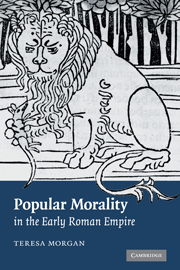Book contents
- Frontmatter
- Contents
- Preface
- List of illustrations
- List of tables
- List of abbreviations
- 1 Introduction
- PART ONE
- 2 Proverbs
- 3 Fables
- 4 Gnomai
- 5 Exempla
- 6 Patterns
- PART TWO
- PART THREE
- Conclusion
- Appendix 1 The political and literary connections of Babrius
- Appendix 2 The definition of a miscellany
- Appendix 3 Popular morality and philosophical doctrine
- List of papyri
- Bibliography
- Index
4 - Gnomai
Published online by Cambridge University Press: 27 October 2009
- Frontmatter
- Contents
- Preface
- List of illustrations
- List of tables
- List of abbreviations
- 1 Introduction
- PART ONE
- 2 Proverbs
- 3 Fables
- 4 Gnomai
- 5 Exempla
- 6 Patterns
- PART TWO
- PART THREE
- Conclusion
- Appendix 1 The political and literary connections of Babrius
- Appendix 2 The definition of a miscellany
- Appendix 3 Popular morality and philosophical doctrine
- List of papyri
- Bibliography
- Index
Summary
Life is not a highway strewn with flowers.
English popular songIn English, the term ‘gnomic saying’ has a wide scope, including proverbs, riddles, mottoes, legal axioms and even the epimythia of fables. Gnômê in Greek and sententia in Latin are used of both proverbs and moralizing quotations, but for clarity, I am restricting them to the second group. The boundary, as we have seen, is occasionally hazy, as poets give memorable form to common sentiments or attributable quotations become proverbial. As usual, when in doubt I follow the sources' own view of whether a particular saying is popular and anonymous (i.e. proverbial) or has a known origin. The most famous example of a borderline case in this chapter is the Sayings of the Seven Sages. These, which should probably, properly, be regarded as anonymous and proverbial, overlap both with the Delphic maxims and with some proverbs, but they were so generally attributed to the Sages in antiquity that it seems perverse not to count them as gnomai.
Despite overlapping vocabulary and some borderline cases, Greek and Latin speakers could and did distinguish between quotations and anonymous proverbs, and the overlap of identical material between anthologies of proverbs and gnomic sayings is tiny (a fraction of a percentage point). The definition of a gnome was of particular interest to rhetoricians. Hermogenes of Tarsus offers this in his second-century Progymnasmata:
Gnome is a summary statement, in universal terms, dissuading or exhorting in regard to something, or making clear what a particular thing is.[…]
- Type
- Chapter
- Information
- Popular Morality in the Early Roman Empire , pp. 84 - 121Publisher: Cambridge University PressPrint publication year: 2007



